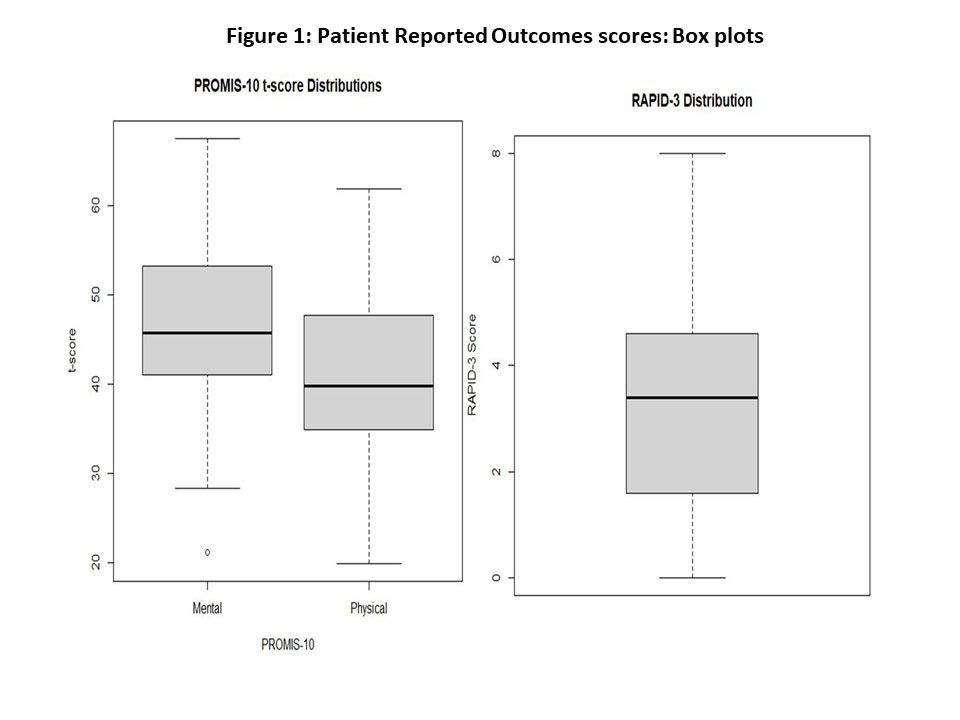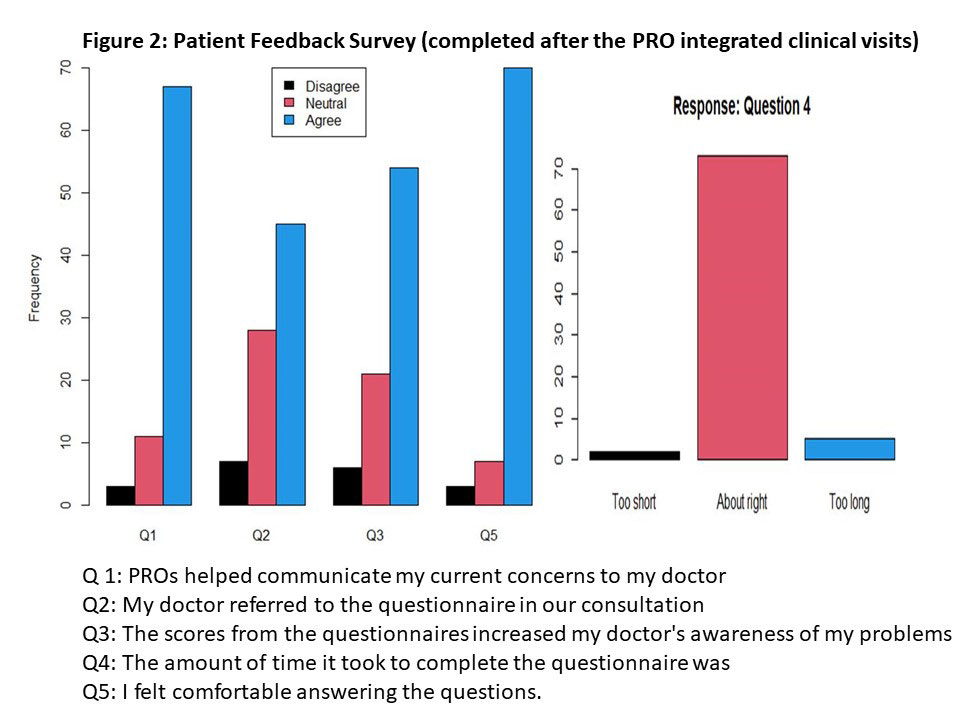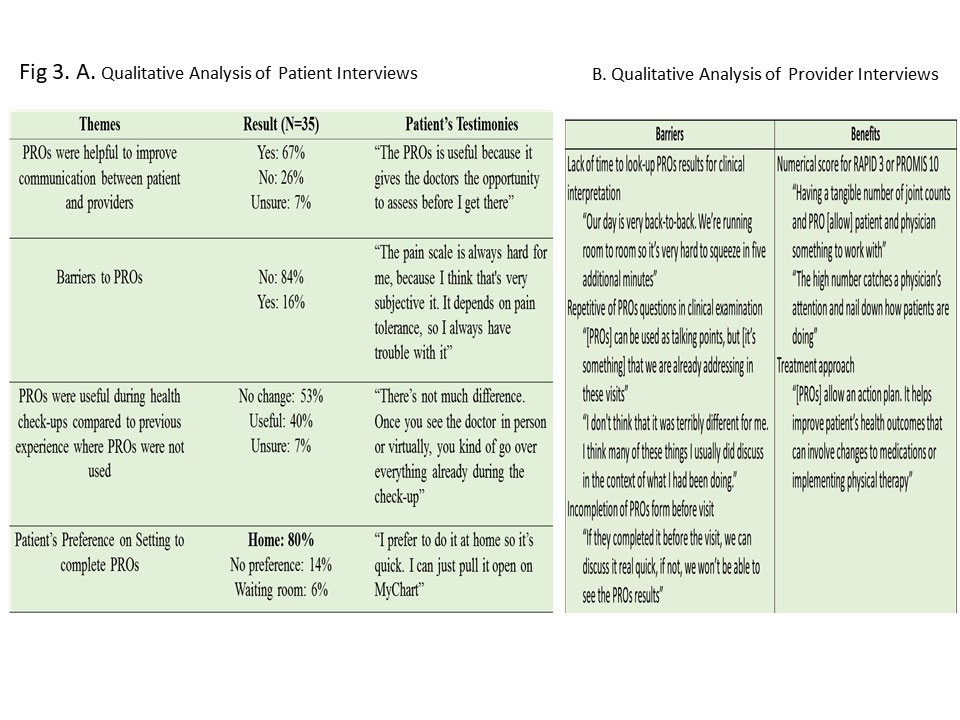Session Information
Session Type: Poster Session A
Session Time: 1:00PM-3:00PM
Background/Purpose: Advancements in measurement science have demonstrated that patient reported outcomes (PROs) can act as supplements to clinical markers for a comprehensive assessment of disease impact, diagnosis and treatment effectiveness for high burden diseases like Rheumatoid Arthritis (RA). PROs are patient generated data which provide an assessment of the patient’s perception of their function. Though guidelines exist to inform methodological and practical decisions to implement PROs in clinical practices, integrating PROs at the level of individual clinical decision making is currently underdeveloped. We conducted a prospective quality improvement project aiming to integrate PROs within our electronic medical records (EMR, Epic system) for RA patients.
Methods: This is a prospective quality improvement project assessing the feasibility and acceptability of PRO integration within routine RA care. The IRB considered this exempt from human subjects research. We selected two PROs with direct input from Rheumatologists, RAPID-3 and PROMIS-10. Any patient with a diagnosis code of RA who had a scheduled visit with a Rheumatologist was sent an email link to complete these PROs. Patients were able to complete these through the patient portal (MyChart). Once completed, the results auto-populated into the patients’ medical records into a flow-sheet (similar to lab results). The results were available to providers during the clinical consult. Patient’s check out from the clinic triggered an automated message through MyChart to request them to complete a feedback questionnaire (to assess acceptability).
Randomly selected patients were approached for semi-structured interviews to further assess their experiences with use of PROs. All rheumatologists completed a feedback survey and interviews after 6 months of launch of project. Interviews were audio recorded and transcribed for analysis.
Results: 122 patients completed both PROMIS-10 surveys and the RAPID-3 questionnaires. Mean age 58.35 years with >90% females and 48% Caucasians. The mean (SD) RAPID-3 score is 9.726 (5.85) (Figure 1). Mean PROMIS physical function score 41.32 (9.02), and mean PROMIS mental health score 46.54 (8.58)
Mean age of patients who completed feedback questionnaires (n=58) was somewhat higher than those who did not (60. 79 vs 56.48). Figure 2 shows the responses to patient feedback questionnaires. Notably, > 65% patients agreed that PROs helped communicate their current concerns to their doctors. Of the 35 participants who were interviewed, >70% reported PROs were useful to improve their experience and satisfaction with clinical visit. Among the Rheumatologists (n=6), 33% reported PROs increased burden of additional time, while 80% reported PROs provided additional clinically useful information, which helped improve symptom management (Figure 3).
Conclusion: Integrating PROs within routine RA care is feasible and acceptable to both patients and providers. Although there is increased burden on providers for the additional time, the information is clinically useful. Future large-scale efforts need to explore the impact of PRO integration on clinical measures.
To cite this abstract in AMA style:
Verma M, Singh P, KEITH M, GERBER L, CHAO R, MCBRIDE E, Zhang Y, Srishord M, YOUNOSSI Z. Feasibility and Acceptability of Integrating Patient Reported Outcomes Within Routine Care of Rheumatoid Arthritis [abstract]. Arthritis Rheumatol. 2022; 74 (suppl 9). https://acrabstracts.org/abstract/feasibility-and-acceptability-of-integrating-patient-reported-outcomes-within-routine-care-of-rheumatoid-arthritis/. Accessed .« Back to ACR Convergence 2022
ACR Meeting Abstracts - https://acrabstracts.org/abstract/feasibility-and-acceptability-of-integrating-patient-reported-outcomes-within-routine-care-of-rheumatoid-arthritis/



